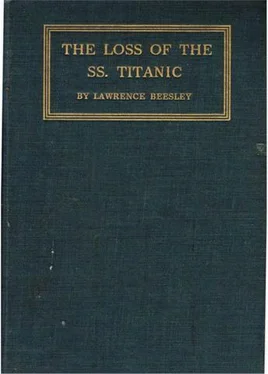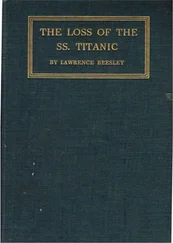And so the order was sent round, “All passengers on deck with lifebelts on”; and in obedience to this a crowd of hastily dressed or partially dressed people began to assemble on the decks belonging to their respective classes (except the steerage passengers who were allowed access to other decks), tying on lifebelts over their clothing. In some parts of the ship women were separated from the men and assembled together near the boats, in others men and women mingled freely together, husbands helping their own wives and families and then other women and children into the boats. The officers spread themselves about the decks, superintending the work of lowering and loading the boats, and in three cases were ordered by their superior officers to take charge of them. At this stage great difficulty was experienced in getting women to leave the ship, especially where the order was so rigorously enforced, “Women and children only.” Women in many cases refused to leave their husbands, and were actually forcibly lifted up and dropped in the boats. They argued with the officers, demanding reasons, and in some cases even when induced to get in were disposed to think the whole thing a joke, or a precaution which it seemed to them rather foolish to take. In this they were encouraged by the men left behind, who, in the same condition of ignorance, said good-bye to their friends as they went down, adding that they would see them again at breakfast-time. To illustrate further how little danger was apprehended—when it was discovered on the first-class deck that the forward lower deck was covered with small ice, snowballing matches were arranged for the following morning, and some passengers even went down to the deck and brought back small pieces of ice which were handed round.
Below decks too was additional evidence that no one thought of immediate danger. Two ladies walking along one of the corridors came across a group of people gathered round a door which they were trying vainly to open, and on the other side of which a man was demanding in loud terms to be let out. Either his door was locked and the key not to be found, or the collision had jammed the lock and prevented the key from turning. The ladies thought he must be afflicted in some way to make such a noise, but one of the men was assuring him that in no circumstances should he be left, and that his (the bystander’s) son would be along soon and would smash down his door if it was not opened in the mean time. “He has a stronger arm than I have,” he added. The son arrived presently and proceeded to make short work of the door: it was smashed in and the inmate released, to his great satisfaction and with many expressions of gratitude to his rescuer. But one of the head stewards who came up at this juncture was so incensed at the damage done to the property of his company, and so little aware of the infinitely greater damage done the ship, that he warned the man who had released the prisoner that he would be arrested on arrival in New York.
It must be borne in mind that no general warning had been issued to passengers: here and there were experienced travellers to whom collision with an iceberg was sufficient to cause them to make every preparation for leaving the ship, but the great majority were never enlightened as to the amount of damage done, or even as to what had happened. We knew in a vague way that we had collided with an iceberg, but there our knowledge ended, and most of us drew no deductions from that fact alone. Another factor that prevented some from taking to the boats was the drop to the water below and the journey into the unknown sea: certainly it looked a tremendous way down in the darkness, the sea and the night both seemed very cold and lonely; and here was the ship, so firm and well lighted and warm.
But perhaps what made so many people declare their decision to remain was their strong belief in the theory of the Titanic’s unsinkable construction. Again and again was it repeated, “This ship cannot sink; it is only a question of waiting until another ship comes up and takes us off.” Husbands expected to follow their wives and join them either in New York or by transfer in mid-ocean from steamer to steamer. Many passengers relate that they were told by officers that the ship was a lifeboat and could not go down; one lady affirms that the captain told her the Titanic could not sink for two or three days; no doubt this was immediately after the collision.
It is not any wonder, then, that many elected to remain, deliberately choosing the deck of the Titanic to a place in a lifeboat. And yet the boats had to go down, and so at first they went half-full: this is the real explanation of why they were not as fully loaded as the later ones. It is important then to consider the question how far the captain was justified in withholding all the knowledge he had from every passenger. From one point of view he should have said to them, “This ship will sink in a few hours: there are the boats, and only women and children can go to them.” But had he the authority to enforce such an order? There are such things as panics and rushes which get beyond the control of a handful of officers, even if armed, and where even the bravest of men get swept off their feet—mentally as well as physically.
On the other hand, if he decided to withhold all definite knowledge of danger from all passengers and at the same time persuade—and if it was not sufficient, compel—women and children to take to the boats, it might result in their all being saved. He could not foresee the tenacity of their faith in the boat: there is ample evidence that he left the bridge when the ship had come to rest and went among passengers urging them to get into the boat and rigorously excluding all but women and children. Some would not go. Officer Lowe testified that he shouted, “Who’s next for the boat?” and could get no replies. The boats even were sent away half-loaded,—although the fear of their buckling in the middle was responsible as well for this,—but the captain with the few boats at his disposal could hardly do more than persuade and advise in the terrible circumstances in which he was placed.
How appalling to think that with a few more boats—and the ship was provided with that particular kind of davit that would launch more boats—there would have been no decision of that kind to make! It could have been stated plainly: “This ship will sink in a few hours: there is room in the boats for all passengers, beginning with women and children.”
Poor Captain Smith! I care not whether the responsibility for such speed in iceberg regions will rest on his shoulders or not: no man ever had to make such a choice as he had that night, and it seems difficult to see how he can be blamed for withholding from passengers such information as he had of the danger that was imminent.
When one reads in the Press that lifeboats arrived at the Carpathia half full, it seems at first sight a dreadful thing that this should have been allowed to happen; but it is so easy to make these criticisms afterwards, so easy to say that Captain Smith should have told everyone of the condition of the vessel. He was faced with many conditions that night which such criticism overlooks. Let any fair-minded person consider some few of the problems presented to him—the ship was bound to sink in a few hours; there was lifeboat accommodation for all women and children and some men; there was no way of getting some women to go except by telling them the ship was doomed, a course he deemed it best not to take; and he knew the danger of boats buckling when loaded full. His solution of these problems was apparently the following:—to send the boats down half full, with such women as would go, and to tell the boats to stand by to pick up more passengers passed down from the cargo ports. There is good evidence that this was part of the plan: I heard an officer give the order to four boats and a lady in number 4 boat on the port side tells me the sailors were so long looking for the port where the captain personally had told them to wait, that they were in danger of being sucked under by the vessel. How far any systematic attempt was made to stand by the ports, I do not know: I never saw one open or any boat standing near on the starboard side; but then, boats 9 to 15 went down full, and on reaching the sea rowed away at once. There is good evidence, then, that Captain Smith fully intended to load the boats full in this way. The failure to carry out the intention is one of the things the whole world regrets, but consider again the great size of the ship and the short time to make decisions, and the omission is more easily understood. The fact is that such a contingency as lowering away boats was not even considered beforehand, and there is much cause for gratitude that as many as seven hundred and five people were rescued. The whole question of a captain’s duties seems to require revision. It was totally impossible for any one man to attempt to control the ship that night, and the weather conditions could not well have been more favourable for doing so. One of the reforms that seem inevitable is that one man shall be responsible for the boats, their manning, loading and lowering, leaving the captain free to be on the bridge to the last moment.
Читать дальше












